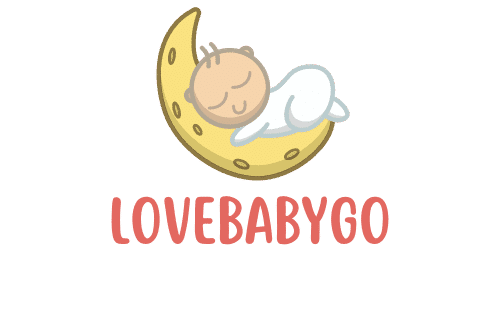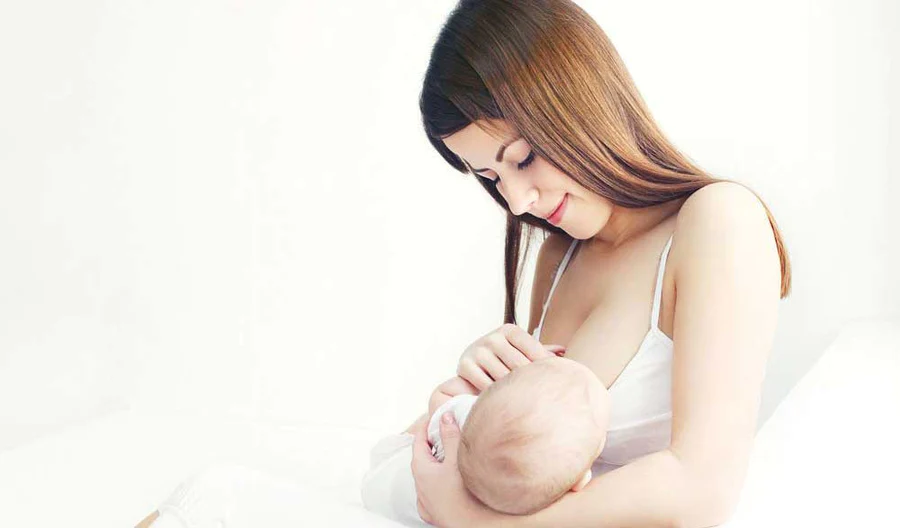If your new baby seems extra fussy, gassy, barfy, snorty, or rashy you may wonder, “Can babies be allergic to breastmilk?”
You are not the only one asking that question! When a breastfed baby isn’t feeling their best, parents often jump to the conclusion that the problem must be connected to nursing.
But here’s the thing, your newborn baby may be super fussy because of breastfeeding…but it’s not because they’re allergic to breastmilk.
Despite what you may have heard, it’s nearly impossible to be allergic to breastmilk! Read on to find out what’s going on.
Is my baby allergic to breastmilk?
No. The natural proteins in breastmilk are so mild that they just do not provoke allergies in babies. That’s why the American Academy of Pediatrics (AAP) says that breastmilk typically doesn’t cause allergic reactions in nursing infants.
On the other hand, recent research has shown that breastfeeding influences a Baby’s immune system development, helping to prevent future food allergies.
How do we know infants don’t get breastmilk allergies? Way back in the 1980s, Swedish scientists proved that even colicky babies are totally fine with their mom’s milk.
They also found that those same babies can be allergic to proteins that pass through the mom’s intestines into her bloodstream and then into her milk.
Translation: While babies aren’t allergic to breastmilk, they can be allergic to the tiny bits of food particles that sneak into your milk by way of your diet.
Food Allergies and Breastfeeding
Babies can sometimes have sensitivities to the microscopic food particles that sneak into your breastmilk within 30 minutes of eating (and linger for hours).
Those sensitivities can sometimes create major hassles. For instance, the AAP reports that sensitivity to a food in Mom’s diet can lead to eczema and colic.
But the truth is, this phenomenon is not very common. Reports show that only two or three out of every 100 exclusively breastfed babies demonstrate an allergic reaction.
Though on the rare side, food allergies and sensitivities in infants are issued to be taken seriously. That’s why it’s important to know the signs of an allergic reaction.
Allergy Symptoms in Babies
It’s always possible that Baby is allergic—or sensitive—to foods like soy, citrus, eggs, nuts, or caffeine, but cow’s milk in Mom’s diet is most often the allergy culprit.
But unlike allergic reactions in big kids and adults (runny nose or sneezing), allergic reactions in infants surface differently.
For older kids and adults, allergies are an overreaction of the immune system as it tries to protect us from foreign proteins. But with infants, the allergy battleground is in the intestines, so their symptoms are often vastly different. Here are the most common symptoms of milk allergies in infants.
- Excessive spitting up
- Vomiting
- Lots of crying and grunting (signs of abdominal pain)
- Slimy diarrhea
- Blood in stools
- Hives
- Itchy red rash inside knees, elbows, and neck (eczema)
- Scaly skin rash
- Coughing or wheezing
- Watery eyes
- Runny or stuffy nose
- Swelling (especially of the lips, tongue, or throat)
When Breastfeeding Allergies Are an Emergency
If your infant shows signs of severe abdominal discomfort (lots of crying and grunting), has hives or eczema, is experiencing severe diarrhea (often with blood in the stool), vomiting, and/or has difficulty breathing that lasts up to several hours after breastfeeding, call your pediatrician immediately.
While milk allergies are indeed rare (especially among breastfed babies) they can occur, and they can be severe. So, fast action is key! The good news? Most babies will eventually outgrow their cow’s milk allergies.
Diagnosing Breastfeeding Allergies
The most common food allergies babies fall prey to are cow’s milk and soy. Much less often, babies can have food allergies or food sensitivities to eggs, nuts, citrus, wheat, and/or shellfish. (These are the same allergenic foods that cause issues in big people, too.)
To pinpoint which allergenic food may be impacting your breastfed baby, your doctor may recommend you stop consuming these foods for a specific period to see if your baby’s symptoms improve. This is called an elimination diet.
If things get better after nixing specific foods, your health care provider will likely then have you gradually add foods back into your diet to see if symptoms return. Here’s what an elimination diet usually looks like:
All-at-Once Elimination Diet
- Remove all cow’s milk products, soy, and eggs from your diet.
- Wait two to four weeks to see if your baby’s symptoms improve. (Food will clear from your breastmilk in just a few days, but it can take longer for your little one’s gut to heal.)
- If Baby seems better, begin to introduce one new type of food at a time.
- If your baby doesn’t improve in four weeks, then their symptoms are likely not food-related—or other foods may need to be eliminated. Consult your child’s pediatrician and perhaps an allergist, too.
- One-At-a-Time Elimination Diet
- Take one food type out of your diet at a time: milk products, then soy, then eggs.
- Allow two to four weeks to pass and then gauge your baby’s symptoms.
- If Baby feels better—bingo!—you found the food culprit!
- If your little one does not improve in four weeks, try removing a different food category from your diet
If your baby does not improve after each elimination, you may need to eliminate different foods or start looking for alternative causes. Talk to your baby’s pediatrician and consider seeing an allergist.
Please, don’t start an elimination diet on your own! Nutrition is very important for a nursing mom. The Centers for Disease Control and Prevention recommends breastfeeding parents take in an additional 330 to 400 calories a day to stay well-nourished.
(Learn more about the best foods that support breastfeeding.) At the same time, the AAP notes that no evidence avoiding certain foods while breastfeeding can help prevent babies from developing allergies.
(The exception: If your baby is at high risk of developing eczema, talk to your healthcare provider about avoiding peanuts, tree nuts, and possibly eggs, cow’s milk, and fish.)
So, if you have any concerns about your baby possibly having allergies—because of fussing, spit-ups, stringy, red-tinged mucus in poop, rash, or any other symptom—make sure you discuss it with your doctor or nurse practitioner before eliminating anything from your diet.
The Truth About Food Allergies and Colic
Even though research has shown that breastfeeding moms truly believe that their diet influences their baby’s cry-fuss behavior—and the majority of breastfeeding mothers will restrict certain foods—in most cases, colic has nothing to do with the food that Mom is eating.
Instead, colic is most often due to a mix of too much chaos, too much quiet, and too little rhythmic stimulation.
That’s why fussy babies can often be soothed by the 5 S’s, which activates the baby’s inborn calming reflex, nature’s “off switch” for crying, and “on switch” for sleep.
Plus, if your baby is sensitive to something in your diet, other symptoms beyond fussiness (like spitting up, rash, blood in poop) will most likely be present, too. If this cluster of symptoms hits close to home, make an appointment with your pediatrician straight away.
Food Sensitivities and Breastfeeding
Not all food reactions are allergies. At times, your little one may be sensitive to certain foods or beverages you ingest, causing reactions like gassiness or moodiness.
Or, your baby might just be responding to the “flavor of the day.” After all, the taste of your breastmilk changes based on what you ate recently.
But that doesn’t mean there’s a problem! For a majority of nursing parents, what you eat isn’t going to make your baby feel bad. Here’s the rundown:
Beans and cruciferous vegetables: Babies can sometimes get fussy or gassy after you eat beans, broccoli, and/or cauliflower.
While there’s no need to swear off these good-for-you foods, you can try to only eat them post-feed to see if that helps.
Caffeine: You don’t have to give up your precious coffee altogether, but it is best to limit caffeine while breastfeeding.
Shoot for no more than one or two cups a day. If you consume more than that, it could negatively impact your baby’s mood and/or sleep.
Spicy foods: Don’t worry! Your spicy meal likely does not affect your baby. Recent research shows that even though piperine (an alkaloid present in black pepper) is detectable in breastmilk for several hours after consuming a curry dish, it’s very unlikely that a baby would be able to perceive the sharpness.
Alcohol: Drinking alcohol in moderation, which means one or two drinks within 24 hours, can be A-okay as long as you wait two hours after imbibing to feed your baby.
That means, don’t nurse yourself for at least two hours if you’ve had one drink and bump that to four hours if you’ve had two. (Learn more about alcohol and breastfeeding.)











